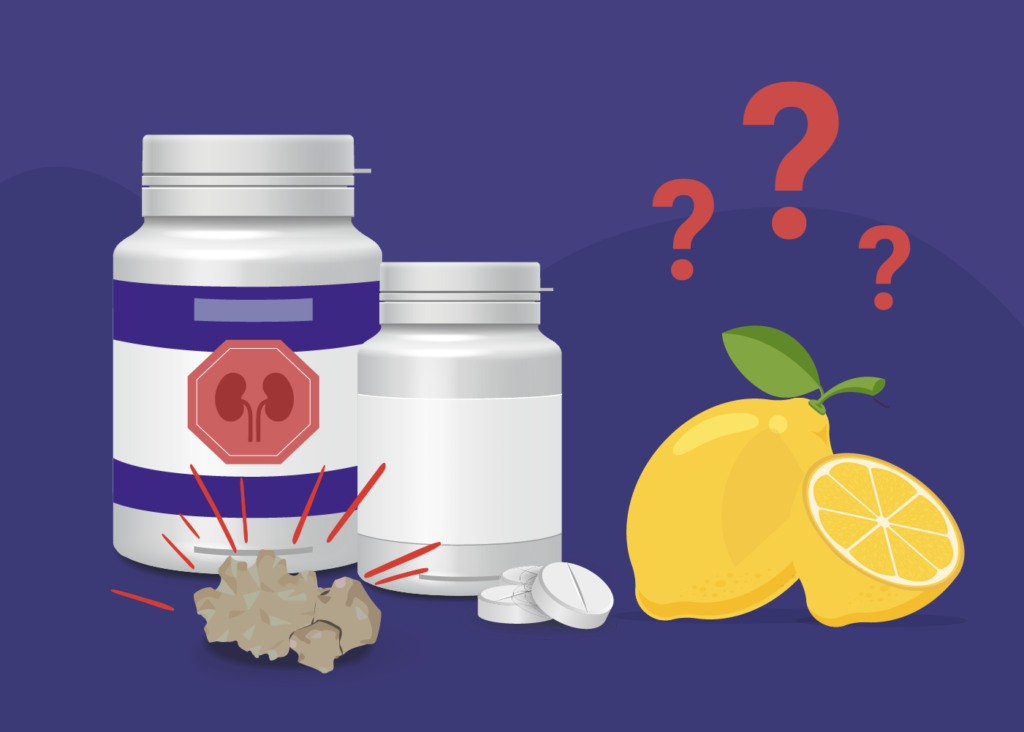Yes, you heard us right. There’s an even better source of citrate than freshly-squeezed lemon juice – and that is alkali citrate! Citric acid is a powerful kidney stone-buster, so here’s how to get more of it in your system.
What is citrate, and where is it usually found?
Citric acid – otherwise known as citrate – is naturally found in citrus fruits, such as lemons, lime, grapefruits, and oranges1. Citrate is used for preserving meats and keeping fruits fresh2, but it is also great at preventing kidney stones from forming3!
Generally, lemon and lime juice contain the highest citrate concentration amongst citrus fruits1, making it a popular natural supplement for kidney stone formers.
How does citrate help to prevent kidney stones?
If you form calcium oxalate or uric acid stones, citrate is particularly helpful in preventing them4,5.
Calcium oxalate stones are formed when your urine is too concentrated, causing calcium and oxalate to bind together into a small mass6. Citrate can slow down or even prevent this process by binding with free calcium7 before it gets a chance to bind with oxalate!
On the other hand, uric acid stones are formed when the urine is too acidic, causing uric acid to form solid crystals instead of soluble ions8. Citrate can raise and/or balance the pH level of your urine, keeping you stone-free9!
Does this mean I should drink more lemon juice?
Not necessarily. Think of the excess oxalate and calcium in your urine as a group of party crashers. Citrate performs the role of a security guard – it needs to get rid of these offending minerals! But in order to do that, it needs to get into your urine first.
Unfortunately, when citrate is in its acidic form – such as in citric acid or lemon juice – not much of it gets into the urine due to poor absorption from the gut10. You’d need to drink jugs of it to get enough citrate in your urine for it to work its magic11!
However, when citrate is in its alkali form (a.k.a potassium citrate, magnesium citrate, sodium citrate), it is metabolized by the kidney10. This makes it easier for it to enter your urine, so it can do its job of binding with calcium or raising your urinary pH level!
In other words, alkali citrate may just be more effective at preventing kidney stones than your regular lemonade.
“That is why your urologist may have prescribed you alkali citrate medication, such as potassium citrate or calcium citrate.” – Dr. Brian Eisner
Some forms of alkali citrate that may be used to treat kidney stones include potassium citrate12. Besides prescription medication, you can also get your dose of alkali citrate from supplements13.
What if I can’t get alkali citrate supplements? Are there any other good alternatives?
There’s a reason doctors nag at us to eat more fruits and vegetables! Fruits and vegetables provide a substantial amount of both alkali and citrate11, which greatly reduces your risk of forming kidney stones.
If you’re a calcium oxalate stone former, remember to moderate your intake of high-oxalate vegetables like spinach, beets, seeds, nuts, rhubarb and potatoes14. For uric acid stone formers, combining a low animal protein diet with more fruits and vegetables will help decrease urine acidity, and, ultimately, your chances of forming stones!
“Fruits and vegetables are alkaline in nature, so it’s the next closest thing to taking alkali citrate supplements!”
– Dr. Brian Eisner
Conclusion
While lemon juice is commonly recommended for preventing kidney stones, remember that citrate in its alkali form is much better at stopping those pesky stones from forming.
At the end of the day, choose the source of citrate that is best for you and your lifestyle. As long as you keep those citrate levels up, you’re one step closer to finally being stone-free!
Sources:
- Penniston, K. L., Nakada, S. Y., Holmes, R. P., & Assimos, D. G. (2008). Quantitative assessment of citric acid in lemon juice, lime juice, and commercially-available fruit juice products. Journal of Endourology, 22(3), 567–570. https://doi.org/10.1089/end.2007.0304
- Citric acid. Chemical Safety Facts. Retrieved from https://www.chemicalsafetyfacts.org/chemicals/citric-acid/
- Coe, F. The grand inhibitor. Kidney Stone Evaluation And Treatment Program. Retrieved from https://kidneystones.uchicago.edu/the-grand-inhibitor/
- Caudarella, R., & Vescini, F. (2009). Urinary citrate and renal stone disease: the preventive role of alkali citrate treatment. Archivio italiano di urologia, andrologia : organo ufficiale [di] Societa italiana di ecografia urologica e nefrologica, 81(3), 182–187.
- Gul, Z., & Monga, M. (2014). Medical and dietary therapy for Kidney Stone Prevention. Korean Journal of Urology, 55(12), 775. https://doi.org/10.4111/kju.2014.55.12.775
- Calcium Oxalate Stones. National Kidney Foundation. (n.d.). Retrieved from https://www.kidney.org/atoz/content/calcium-oxalate-stone
- Coe, F. Calcium binding by citrate. Kidney Stone Evaluation And Treatment Program. Retrieved from https://kidneystones.uchicago.edu/calcium-binding-by-citrate/
- Uric acid stones: Causes, symptoms & treatment. Cleveland Clinic. Retrieved from https://my.clevelandclinic.org/health/diseases/16378-uric-acid-stones
- Mattle, D., & Hess, B. (2005). Preventive treatment of nephrolithiasis with alkali citrate—a critical review. Urological Research, 33(2), 73–79. https://doi.org/10.1007/s00240-005-0464-8
- Coe, F. How potassium citrate pills work. Kidney Stone Evaluation And Treatment Program. Retrieved from https://kidneystones.uchicago.edu/how-citrate-gets-into-the-urine/
- Ferraro, P. M., Bargagli, M., Trinchieri, A., & Gambaro, G. (2020). Risk of kidney stones: Influence of dietary factors, dietary patterns, and Vegetarian–Vegan Diets. Nutrients, 12(3), 779. https://doi.org/10.3390/nu12030779
- 6 easy ways to prevent kidney stones. National Kidney Foundation. (n.d.). Retrieved from https://www.kidney.org/atoz/content/kidneystones_prevent
- Heilberg, I. P., & Goldfarb, D. S. (2013). Optimum nutrition for kidney stone disease. Advances in Chronic Kidney Disease, 20(2), 165–174. https://doi.org/10.1053/j.ackd.2012.12.001
- Harris, J. How To Eat A Low Oxalate Diet. Kidney Stone Evaluation And Treatment Program. Retrieved from https://kidneystones.uchicago.edu/how-to-eat-a-low-oxalate-diet/





